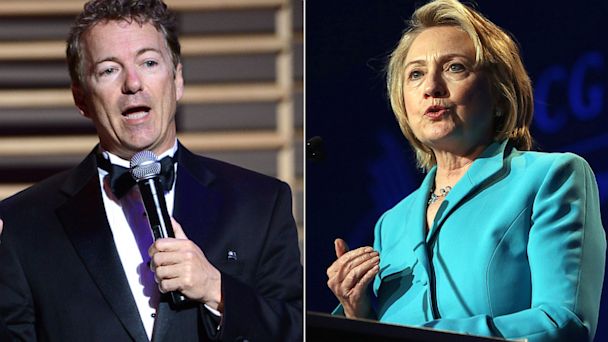Presidential Campaign Shadows No More: It's Already 2016

(Kevin Mazur/WireImage/Getty Images | Scott Olson/Getty Images)
The shadow campaign is out of the shadows.
Consider the case of Hillary Rodham Clinton. The former secretary of state is just a few months into the "beaches and speeches" portion of her career, at least a year and a half away from any kind of decision about running for president.
But this week, big-moneyed Republican donors will be meeting to plot ways to stop a Clinton candidacy. The meeting, to be presided over by Mitt Romney's former campaign manager, is the outgrowth of a new super PAC, America Rising, that's already taking near-daily aim at Clinton's record in case she winds up running, or to convince her not to.
You can track the new effort at StopHillary2016.org. That's not to be confused with StopHillaryPAC.org, founded by a Colorado Republican official "to save America from the destructive far-left, liberal cancer created by Bill and Hillary Clinton that's trying to corrupt America."
Poor Hillary Clinton, right? Don't worry too much about her - full-blown operations have sprung up in support of the non-candidate's non-candidacy, too.
The most prominent of those, Ready for Hillary PAC, is getting fundraising help from a roster of high-profile Democrats that includes James Carville, Harold Ickes, and Sen. Claire McCaskill. It has no formal connection to the actual Hillary Clinton, though that hardly matters.
Today, the Democratic PAC American Bridge announced its new "Correct the Record" project with a promise to defend Clinton and Vice President Joe Biden, among others, against "false attacks leveled by Republicans," and to "compile and publish research on those candidates who will potentially seek the Republican presidential nomination in 2016."
"By employing a sword and shield strategy that keeps the pressure on potential Republican nominees while defending our own, Correct the Record is taking on a critical role early in the cycle to the advantage of Democrats' eventual nominee," said none other than James Carville (see above) in announcing the project.
Political reporters for years have covered the "shadow campaign," the quiet work of connecting with donors and local officials, speechmaking in critical presidential states, and early opposition research that seeks to define candidates before they have a chance to do that for themselves.
The pending 2016 race, though, looks like the election cycle where the shadows are illuminating themselves. Aside from the permanent campaign operations that are the Republican and Democratic national committees, opposition-research clearinghouses are now firmly in place in both parties, ready to shovel dirt on opponents real and imagined.
Even the speeches and meetings are getting less subtle. Sens. Rand Paul, R-Ky., and Ted Cruz, R-Texas, are popping up regularly not just on cable television but in states like Iowa, New Hampshire and South Carolina. It's almost as if it was 2015, or just 2014, when congressional races will hand national exposure to possible candidates.
Clinton and Biden can be more circumspect, only because they can afford to be this far out. But Gov. Martin O'Malley, D-Md. - an extremely likely candidate in a non-Clinton field - has already begun giving speeches that seek to expand his national profile, with six months left in his term of office.
Add to that the media coverage, and you can be forgiven for having to check the calendar. Every move by New Jersey Gov. Chris Christie that doesn't involve him heaping praise on President Obama is seen as a move to the right for a GOP primary. Likewise Sen. Marco Rubio is seen as courting conservatives for 2016 in lending his name to an anti-abortion effort that happens to be exactly in line with his voting record.
And in Texas yesterday, Rick Perry not only announced that he would not seek a fourth term as governor, but he also positioned himself to possibly take another stab at a presidential run in 2016.
It's become trite to say any campaign cycle is starting earlier than ever. It's true, and it's been true for every presidential campaign in recent memory.
What's different now is that the subtlety is gone. So we may as well admit it: 2016 is now.